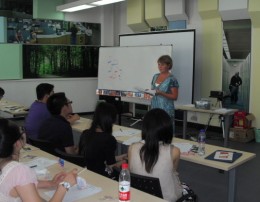
Jeannette Horwitz, director of the LEAP Program leads a discussion in a classroom at the Dalian University of Technology in China.
Dayna Foster underwent an eye-opening cultural experience when she taught at the Dalian Institute of Science and Technology in China.
“My biggest reason for wanting to go to Dalian was because I have always thought about teaching English in China,” said Foster.
“I also knew the culture would be quite different, so I wanted to experience it firsthand, on a day-to-day basis, over several weeks,” she said. “I hoped that the experience would give me the ‘data’ I needed to make a decision about applying for and accepting a position in China.”
Foster is pursuing a Master of Arts in Teaching English to Speakers of Other Languages (TESOL). Her enthusiasm, patience and a passion to learn about new cultures are traits she shares with the other three M.A. TESOL students who traveled to the Dalian Institute this summer.
For many years, Wright State has had a close relationship with the Dalian Institute. Recent exchange initiatives have only strengthened these ties.
This international outreach is mutually beneficial: not only do TESOL students gain experience for their future careers, but they familiarize Dalian students with the English language and American methods of teaching.
Many of those Chinese students have later come to study computer science or engineering at Wright State.
Once international students are officially enrolled at Wright State, their English fluency is evaluated to determine their placement in the Learning English for Academic and Professional Purposes Program (LEAP).
“The primary goal [of LEAP] is to introduce the international students to American academics,” said Chris Hall, Ph.D., associate professor of English.
Hall explained that an uneasy transition into a foreign country with an unfamiliar language can lead to culture shock; LEAP familiarizes international students with not only American customs and the English language, but also with Wright State.
Consisting of five levels, ranging from beginning to advanced, the LEAP curriculum has prepared many international students at Wright State for academic success.
“LEAP classes were my first classes in Wright State,” said Bi Zhang, another TESOL student. “The classes prepared me for different major courses. Meanwhile, a lot of in and out of class activities were provided and I made friends, then built up my own interpersonal relationships.”
Since completing LEAP, Zhang has studied TESOL and was a part of this summer’s group who traveled to the Dalian Institute. Next year, she hopes to utilize the teaching methods she learned at the Dalian Institute to teach other international students in the LEAP Program.
“The best part of the whole experience was definitely working with the students,” said Foster.
“The reward manifests itself as I watch these students integrate into the academic culture at WSU and the larger community as well,” said Foster. “One of the most valuable lessons I learned was to be flexible and not be a slave to the lesson plan. I think this will make me a better teacher and ultimately benefit my students.”
Although condensed into four weeks, the curriculum the TESOL students taught at Dalian is similar to the LEAP Program at Wright State. Both are intensive, yet effective.
Jeannette Horwitz, director of the LEAP Program, is proud of the work her TESOL students do—both at Wright State and when teaching in a foreign country.
Horwitz was born in Sweden and learned English as a second language throughout her academic career. As a result, Horwitz is a firm proponent of learning languages through immersion and experience.
She also emphasizes the value of learning new languages. “Because of our globalized society, no matter what career field you go into, you will absolutely be working with people from other countries,” she said.
Due to this vast globalization, Horwitz says that programs like LEAP and TESOL are rapidly becoming more important. “There is a growing number of job opportunities for TESOL graduates—especially in the area,” she said.
If interested in pursuing a career in teaching English in other countries, visit the TESOL homepage at http://www.wright.edu/cola/Dept/eng/tesol/index.html.
To learn more about how Wright State accommodates international students, visit the LEAP homepage at http://www.wright.edu/academics/prog/leap/.
- Dalian University of Technology in China
- For many years, Wright State has had a close relationship with the Dalian Institute. Recent exchange initiatives have only strengthened these ties.
- Dalian students learning English from Wright State students and professors.
- Dalian students display flashcards they’re using to learn English.
- Wright State instructors incorporate physical itmes during some instruction to teach English.
- Jeannette Horwitz, director of the LEAP Program leads a discussion in a classroom at the Dalian University of Technology in China.

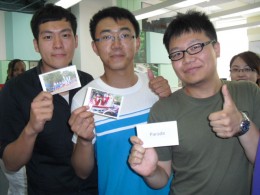
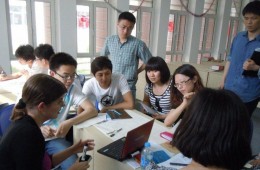


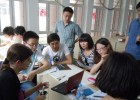
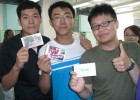
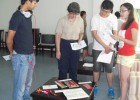
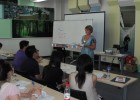
 Wright State alum Lindsay Aitchison fulfills childhood space-agency dream
Wright State alum Lindsay Aitchison fulfills childhood space-agency dream  Wright State business professor, alumnus honored by regional technology organizations
Wright State business professor, alumnus honored by regional technology organizations  Wright State University Foundation awards 11 Students First Fund projects
Wright State University Foundation awards 11 Students First Fund projects  Gov. DeWine reappoints Board Treasurer Beth Ferris and names student Ella Vaught to Wright State Board of Trustees
Gov. DeWine reappoints Board Treasurer Beth Ferris and names student Ella Vaught to Wright State Board of Trustees  Joe Gruenberg’s 40-Year support for Wright State celebrated with Honorary Alumnus Award
Joe Gruenberg’s 40-Year support for Wright State celebrated with Honorary Alumnus Award 